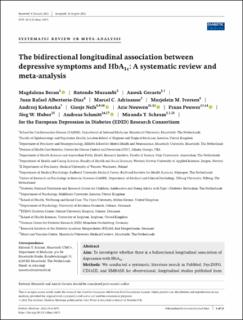| dc.contributor.author | Beran, Magdalena | |
| dc.contributor.author | Muzambi, Rutendo | |
| dc.contributor.author | Geraets, Anouk | |
| dc.contributor.author | Albertorio-Diaz, Juan Rafael | |
| dc.contributor.author | Adriaanse, Marcel C. | |
| dc.contributor.author | Iversen, Marjolein M. | |
| dc.contributor.author | Kokoszka, Andrzej | |
| dc.contributor.author | Nefs, Giesje | |
| dc.contributor.author | Nouwen, Arie | |
| dc.contributor.author | Pouwer, Frans | |
| dc.contributor.author | Huber, Jörg W. | |
| dc.contributor.author | Schmitt, Andreas | |
| dc.contributor.author | Schram, Miranda T. | |
| dc.contributor.author | European Depression inDiabetes, (EDID) Research Consortium | |
| dc.date.accessioned | 2022-09-29T08:26:23Z | |
| dc.date.available | 2022-09-29T08:26:23Z | |
| dc.date.created | 2022-02-01T14:36:11Z | |
| dc.date.issued | 2021 | |
| dc.identifier.citation | Beran, M., Muzambi, R., Geraets, A., Albertorio‐Diaz, J. R., Adriaanse, M. C., Iversen, M. M., Kokoszka, A., Nefs, G., Nouwen, A., Pouwer, F., Huber, J. W., Schmitt, A., & Schram, M. T. (2021). The bidirectional longitudinal association between depressive symptoms and HbA1c: A systematic review and meta‐analysis. Diabetic Medicine, 39(2):e14671. | en_US |
| dc.identifier.issn | 0742-3071 | |
| dc.identifier.uri | https://hdl.handle.net/11250/3022468 | |
| dc.description.abstract | Aim
To investigate whether there is a bidirectional longitudinal association of depression with HbA1c.
Methods
We conducted a systematic literature search in PubMed, PsycINFO, CINAHL and EMBASE for observational, longitudinal studies published from January 2000 to September 2020, assessing the association between depression and HbA1c in adults. We assessed study quality with the Newcastle-Ottawa-Scale. Pooled effect estimates were reported as partial correlation coefficients (rp) or odds ratios (OR).
Results
We retrieved 1642 studies; 26 studies were included in the systematic review and eleven in the meta-analysis. Most studies (16/26) focused on type 2 diabetes. Study quality was rated as good (n = 19), fair (n = 2) and poor (n = 5). Of the meta-analysed studies, six investigated the longitudinal association between self-reported depressive symptoms and HbA1c and five the reverse longitudinal association, with a combined sample size of n = 48,793 and a mean follow-up of 2 years. Higher levels of baseline depressive symptoms were associated with subsequent higher levels of HbA1c (partial r = 0.07; [95% CI 0.03, 0.12]; I238%). Higher baseline HbA1c values were also associated with 18% increased risk of (probable) depression (OR = 1.18; [95% CI 1.12,1.25]; I20.0%).
Conclusions
Our findings support a bidirectional longitudinal association between depressive symptoms and HbA1c. However, the observed effect sizes were small and future research in large-scale longitudinal studies is needed to confirm this association. Future studies should investigate the role of type of diabetes and depression, diabetes distress and diabetes self-management behaviours. Our results may have clinical implications, as depressive symptoms and HbA1c levels could be targeted concurrently in the prevention and treatment of diabetes and depression. | en_US |
| dc.language.iso | eng | en_US |
| dc.publisher | Wiley | en_US |
| dc.rights | Navngivelse-Ikkekommersiell 4.0 Internasjonal | * |
| dc.rights.uri | http://creativecommons.org/licenses/by-nc/4.0/deed.no | * |
| dc.title | The bidirectional longitudinal association between depressive symptoms and HbA1c: A systematic review and meta-analysis | en_US |
| dc.type | Peer reviewed | en_US |
| dc.type | Journal article | en_US |
| dc.description.version | publishedVersion | en_US |
| dc.rights.holder | © 2021 The Authors. | en_US |
| dc.source.volume | 39 | en_US |
| dc.source.journal | Diabetic Medicine | en_US |
| dc.source.issue | 2 | en_US |
| dc.identifier.doi | 10.1111/dme.14671 | |
| dc.identifier.cristin | 1996419 | |
| dc.source.articlenumber | e14671 | en_US |
| cristin.ispublished | true | |
| cristin.fulltext | original | |
| cristin.qualitycode | 1 | |

